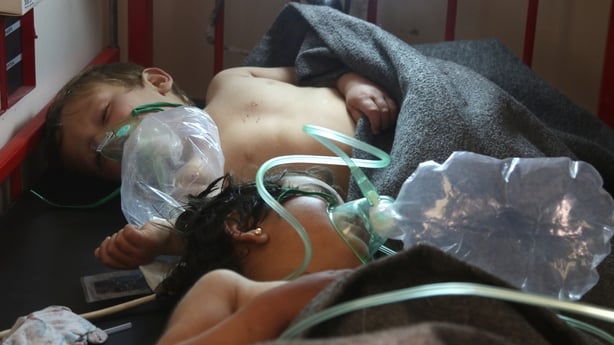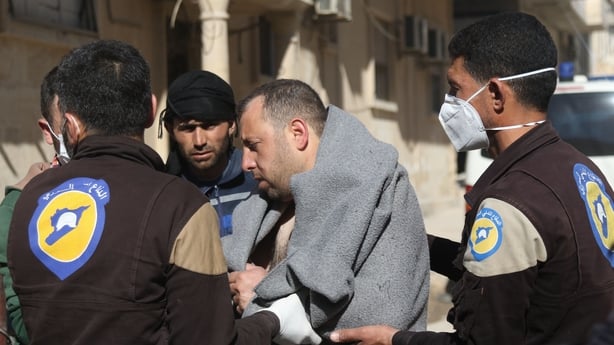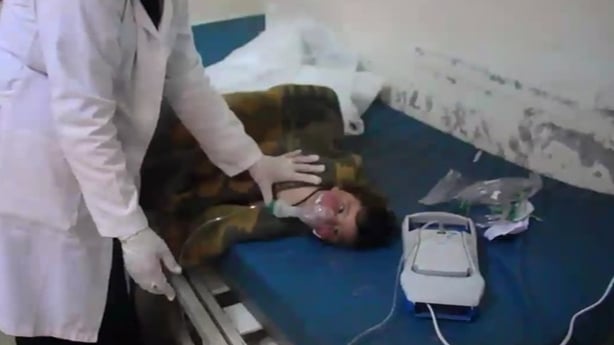A suspected gas attack, believed to be by Syrian government jets, has killed at least 58 people including 11 children under the age of eight in the northwestern province of Idlib.
A Syrian military source strongly denied the army had used any such weapons.
The attack caused many people to choke or faint, and some had foam coming out of their mouths, the Syrian Observatory for Human Rights said, citing medical sources who described it as a sign of a gas attack.
The air strikes on the town of Khan Sheikhoun, in the south of rebel-held Idlib, also wounded more than 60 people, said the Observatory, a Britain-based war monitoring group.
Mounzer Khalil, head of Idlib's health authority, said the attack had killed more than 50 people and wounded 300.


Activists in northern Syria circulated pictures on social media showing a reported victim with foam around his mouth, and rescue workers hosing down almost naked children squirming on the floor.
The Syrian military source denied allegations that government forces had used chemical weapons, dismissing the accounts as rebel propaganda.
The army "has not and does not use them, not in the past and not in the future, because it does not have them in the first place," the source said.
A joint inquiry for the United Nations and the global chemical weapons watchdog has previously accused government forces of toxic gas attacks.
A UN spokesman has said that any reports of the use of chemical weapons, especially on civilians, is "extremely alarming and disturbing".
EU diplomatic chief Federica Mogherini said Syrian President Bashar al-Assad's regime bears "primary responsibility" for the attack.
"Today the news is awful," she said in an interview with media organisations in Brussels on the sidelines of a EU-UN conference that was meant to focus on the post-conflict situation in Syria.
Trump condemns Syria 'gas' attack
US President Donald Trump has condemned the attack, saying that it is "reprehensible and cannot be ignored by the civilized world".
He blamed Assad for the attack but added that his actions his regime are "a consequence of the past administration's weakness and irresolution.
"President Obama said in 2012 that he would establish a "red line" against the use of chemical weapons and then did nothing."
US President Donald Trump says the chemical attack in Syria is 'reprehensible and cannot be ignored by the civilized world' pic.twitter.com/mFrtkGRe2C
— RTÉ News (@rtenews) April 4, 2017
British Prime Minister Theresa May called for an investigation into the attack.
She said: "I'm appalled by the reports that there's been a chemical weapons attack on a town south of Idlib, allegedly by the Syrian regime.
"If proven, this will be further evidence of the barbarism of the Syrian regime." She urged the Organisation for the Prohibition of Chemical Weapons to investigate the incident.
French President Francois Hollande said that the attack shows that Assad continues to benefit from complicity of allies to act with impunity.
Syria has repeatedly denied using such weapons during the six-year-old war, which has killed hundreds of thousands and created the world's worst refugee crisis.
Warplanes continued to pound the town after the attack.
Russia's military said its planes did not carry out any strikes near the town of Khan Sheikhun, where air strikes hit a hospital as doctors treated victims of the suspected chemical attack.
"Planes of the Russian air force have not carried out any strikes near Khan Sheikhun of Idlib province," said a statement by the Russian defence ministry.
The Syrian conflict pits Assad's government, helped by Russia and Iranian-backed militias, against a wide array of rebel groups, including some supported by Turkey, the United States and Gulf monarchies.
Syrian and Russian air strikes have pounded various parts of Idlib, according to the Observatory, despite a ceasefire that Turkey and Russia brokered in December.
The province contains the largest populated area controlled by rebels - both nationalist Free Syrian Army groups and Islamist factions including the former al Qaeda-linked Nusra Front.
Idlib's population has ballooned with thousands of fighters and civilians shuttled out of Aleppo city and areas around Damascus that the government has retaken in recent months.
US air strikes since January have also hit several areas in the rural province where jihadists have a powerful presence. Syria's government officially joined the Chemical Weapons Convention and turned over its chemical arsenal in 2013, as part of a deal to avert US military action.
But there have been repeated allegations of chemical weapons use by the government since then, with a UN-led investigation pointing the finger at the regime for at least three chlorine attacks in 2014 and 2015.

The government denies the use of chemical weapons and has in turn accused rebels of using banned weapons.
More than 320,000 people have been killed in Syria since the conflict began in March 2011 with anti-government protests.

